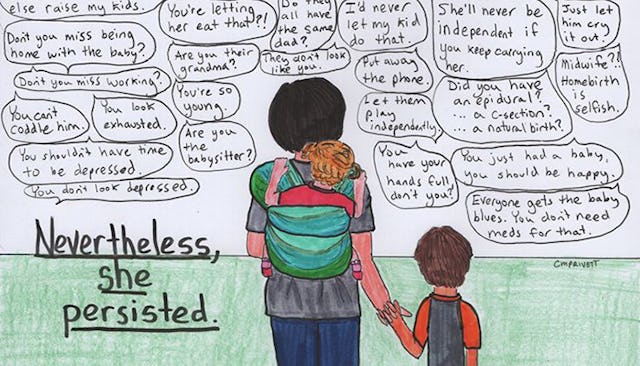Nevertheless, She Persisted: Mom Edition

Nevertheless, She Persisted
Last month, Senator Elizabeth Warren was silenced while trying to read an objection to the nomination of Jeff Sessions for Attorney General. Majority Leader Mitch McConnell, thinking he was giving a valid reason for silencing Warren, explained:
“She was warned. She was given an explanation. Nevertheless, she persisted.”
His three short sentences became a battle cry for fed-up women, everywhere.
The lines have since taken on a life of their own. Women are getting them tattooed on their bodies. Artists are imaging the words in incredible pieces of artwork. Even infants are sporting the battle-cry.
One artist took to the words and began illustrating what they meant to her. One of her illustrations touched so many women that it went viral:
Courtney Privett took the words so many of us hear day to day and turned them into a moving visual example of what women endure. She’s done it again, this time with a mom twist:
You have your hands full, don’t you? Are you the babysitter? That boy needs a good spanking. You can’t bond as well if you bottle feed. The comments go on and on, in the form of thought bubbles absolutely inundating a mother standing in front of them with her child.
Privett, a mom of three, told The Huffington Post that she experienced postpartum depression after the birth of her third child. She explained that all of these words are things that have been directed to her, her friends, or her family. “All of those little words I’d heard transitioned into invasive thoughts and it overwhelmed me as it became part of my depression,” she said. “I felt disconnected from everything and had trouble working through the steps necessary to do even simple things like change a diaper or make a sandwich.”
She told Huffpost that with medication and therapy she was able to recover, but admitted she was lucky because many moms don’t have the resources to do the same.
“I’m hoping to encourage parents that it’s OK to do what is right for their specific situations, and also for all people to be more aware of how they speak to others,” she said. “Words matter, especially when directed toward vulnerable people.”
This article was originally published on